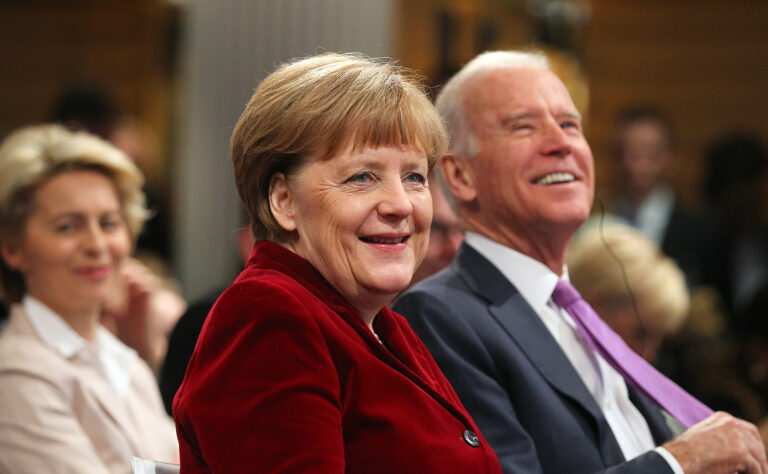
This article was originally published by Radio Free Europe/Radio Liberty and is reprinted with permission.
Foreign ministers from the Baltics have expressed solidarity with Ukraine, a fellow former Soviet republic, and called for Moscow to de-escalate rising tensions over a Russian troop buildup near Ukraine’s border and in occupied Crimea.
“Ukraine is legally and morally right, and we will emphasize this in international organizations. Currently, there is only one side that needs to de-escalate its actions — the Russian Federation,” Latvian Foreign Minister Edgars Rinkevics told a joint press conference with his counterparts from Lithuania and Estonia as well as Ukraine in Kyiv.
“Ukraine will never be alone,” Lithuania’s Gabrielius Landsbergis added.
Recent photographs, video, and other data suggest major movements of Russian armed units toward or near Ukraine’s border and into Crimea, fueling concerns that Russia is preparing to send forces into Ukraine.
Ukraine and the West also blame Kremlin-backed separatists holding parts of the country’s eastern regions of Donetsk and Luhansk for a recent spike in hostilities, while Moscow has pointed the finger at Kyiv.
Russia has rejected Western calls to pull back its troops, denying they are a threat and saying that military movements within Russia are an internal sovereign issue.
The Kremlin has also warned that Moscow “will not remain indifferent” to the fate of Russian speakers who live in Ukraine’s east, an area where Moscow has made it easier in recent months for them to gain Russian passports.
Russia seized Ukraine’s Crimean Peninsula in March 2014, sending in troops and staging a referendum denounced as illegitimate by at least 100 countries. Moscow also backs separatists in a war against Ukrainian government forces that has killed more than 13,000 people in eastern Ukraine since April 2014.
Nearly 30 Ukrainian soldiers have been reported killed since the start of the year, compared with 50 in all of 2020, when fighting in the conflict subsided as a new cease-fire deal came into force in July.
Ukrainian Foreign Minister Dmytro Kuleba on April 15 accused Moscow of “openly threatening Ukraine with war and the destruction of Ukrainian statehood,” and said it was necessary to show Russia that its actions in eastern Ukraine could have “very painful” consequences.
“Today, the four of us can firmly declare that we condemn the exacerbation of the situation by Russia, the actions and statements of Moscow aimed at escalating military tensions and undermining diplomatic efforts to resolve the Russian-Ukrainian conflict,” Kuleba said.
William Burns, director of the Central Intelligence Agency (CIA), told the U.S. Senate Intelligence Committee on April 14 that Russia had amassed sufficient military forces and equipment along Ukraine’s border to “provide the basis for limited military incursions” into the country.
Burns, a former ambassador to Moscow, said “most of my white hair came from dealing” with Russia under President Vladimir Putin.
“So one thing I’ve learned is not to underestimate the ways in which President Putin and the Russian leadership can throw [their] weight around,” he added.
With tensions rising, U.S. President Joe Biden has proposed a summit with Putin, but the Kremlin said on April 15 that any new U.S. sanctions would reduce the chances of such a summit taking place.
Washington is reportedly planning to target a dozen Russian individuals, including intelligence officials, and as many as 30 entities for election interference or a hack into U.S. government and corporate computer networks last year.
Biden and German Chancellor Angela Merkel spoke by phone on April 14 and agreed that a reduction of Russian troops along the border with Ukraine would help de-escalate tensions in the region, Merkel’s office said in a statement.
The talks came after NATO Secretary-General Jens Stoltenberg said the allies were calling on Russia to “stop its pattern of aggressive provocations” following a videoconference attended by ministers from the 30-member alliance.
Stoltenberg has called Russia’s military buildup “the largest massing of Russian troops since the illegal annexation of Crimea in 2014.”
Speaking in Brussels, U.S. Defense Secretary Lloyd Austin said Ukraine had been supplied with equipment and training for some time and the United States would continue such support as needed.
Ukrainian President Volodymyr Zelenskiy’s office announced he would travel to France on April 16 for a working visit during which he is scheduled to hold talks with French President Emmanuel Macron.
France, Germany, Ukraine, and Russia are part of the so-called Normandy Format set up to try to resolve the Ukraine conflict.
Zelenskiy is to be accompanied by his wife, Olena Zelenska, who is to meet with French first lady Brigitte Macron.
The statement did not provide further details.
0 comments :
Post a Comment